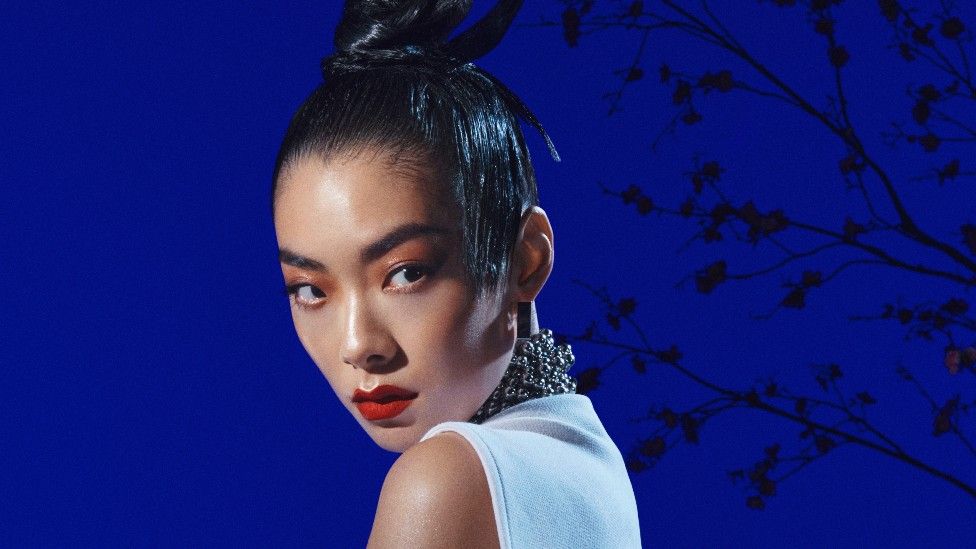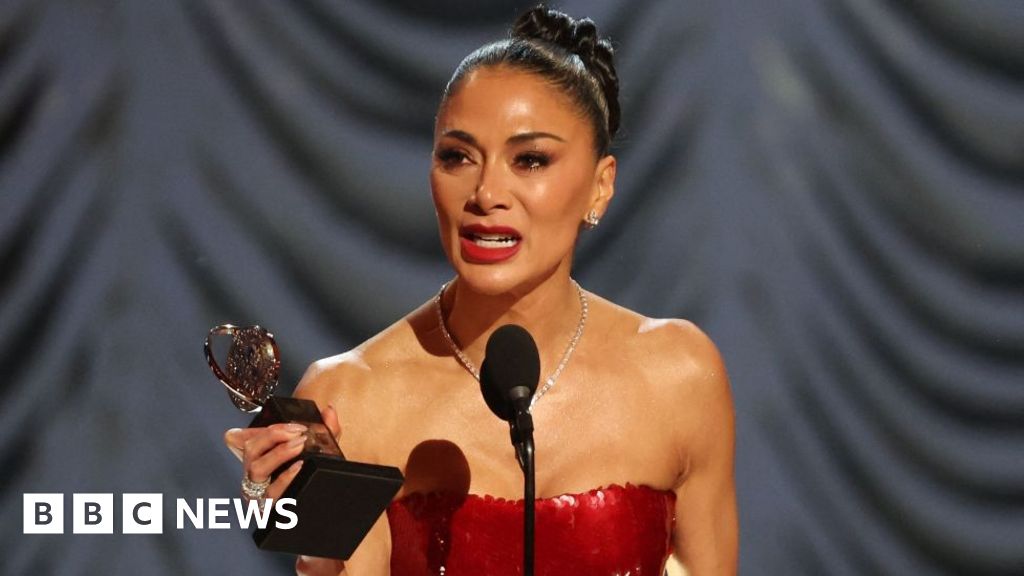ARTICLE AD BOX
By Mark Savage
BBC Music Correspondent
 Image source, Thurstan Redding
Image source, Thurstan Redding
The pop star says her new album is inspired by Garbage, Avril Lavigne, Shania Twain, Bon Jovi and Pussycat Dolls
Rina Sawayama was at a crucial career point when she started writing her second album last year.
Her self-titled debut, a mind-bending cacophony of nu-metal, production line pop and 90s R&B, had become a critical smash during lockdown, and she suddenly found herself in the company of artists she idolised.
Elton John asked the singer to re-record her LGBTQ anthem Chosen Family as a duet; Lady Gaga invited her to sing on a remix of her Chromatica track Free Woman; and Charli XCX signed her up for a collaborative single, Beg For You.
The Line Of Best Fit named Sawayama the best album of 2020. The New York Times put it second, and the Guardian voted it third. So fans were understandably confused when the record failed to get a nomination for the Mercury Prize.
It transpired that it didn't qualify. The singer, who moved from Japan to the UK at the age of five, didn't hold a British passport, so she was ruled ineligible.
Initially, she didn't want to speak up. "Part of me that worried that I was going to get blacklisted from the music industry," she says. But when she did, it caused a huge noise. The hashtag #SawayamaIsBritish started trending and the BPI - which organises both the Mercury and the Brit Awards - agreed to change their criteria. A couple of months later, Sawayama was nominated for her first ever Brit, in the Rising Star category.
So when the singer hit the studio in the middle of 2021, she had a lot to prove.
She also had a song, This Hell - a snarling takedown of homophobia - that she knew could be her comeback.
There was only one problem. The guitar riff sounded a lot like ABBA's Gimme! Gimme! Gimme! (A Man After Midnight).
Abba are notoriously protective of their copyright, so when Sawayama realised the similarity, she "freaked out".
"Then I contacted my publishers, and they freaked out, too," she says. "They were like, 'ABBA are absolutely going to say no to this, and you have to change it.'"
Image source, Getty Images
Image caption,ABBA rarely allow other artists to sample or interpolate their music
In a panic, the singer re-recorded the song with an alternate (but inferior) guitar hook. "But then I was like, 'You know what? This is crazy. I'm sure I can figure this out.'
"So I called up Elton John and I said, 'Elton, do you know Benny or Bjorn from Abba?'"
Through a contact at Universal Music, Elton sent the song to Sweden, accompanied by a handwritten letter from Sawayama herself. "I said: 'Look, I love your music. I'm happy to split the publishing. I'm so sorry, I didn't mean this to happen.'"
Days later, Benny replied, saying the riff had been approved: "No problem. Absolutely fine. All the best."
"So that song," Sawayama beams, "has the blessing of ABBA!"
Warning: Third party content may contain adverts
She might come endorsed by pop royalty but, in person, Sawayama is gratifyingly low-key.
We chat backstage at the Latitude festival, where her dressing room contains a single white sofa, one small mirror and kit bag containing her stage outfit. She makes herself a paper cup of green tea from a communal urn and settles in for a chat.
It's our third interview but, thanks to Covid, the first time we've met in person. So what was it like becoming a pop star in the middle of a pandemic?
"Absolutely surreal," she says. "I lived in perpetual confusion and a bit of guilt, because things were going well work-wise, but I knew that wasn't the experience for most of the world."
In a strange way, lockdown lit a rocket under her career. Sawayama was singing about family trauma, alienation and depression at a time when many people were locked up with their families, or living alone with no prospect of escape.
"I think people were ready to get deep with their emotions, because who else were you going to talk to?" she says.
Her follow-up is no less exposing.
Called Hold The Girl, "it's about looking back on your childhood as an adult" and, in Sawayama's case, revisiting some deeply unpleasant memories.
Innocence lost
"I grew up with immigrant parents who were fighting and separating," she says, "and I was often caught between my mum and my dad, who would bad-talk each other to me".
After her parents split, Sawayama and her mother were left to fend for themselves. Home life was a constant "culture clash", she says. Her mum's limited English meant she couldn't help with schoolwork; while Sawayama's immersion in British pop culture alienated her from the family.
By the age of 13, she was drinking every week. "We'd get a three-litre Fanta and pour a whole bottle of vodka into it," before sneaking into parties and hanging around Camden on school nights.
Image source, Getty Images
Image caption,The singer says the first time she felt famous was when fans waited outside her hotel in New York earlier this year
Those experiences inform the darker corners of her new album. She's reluctant to go into specifics, but describes a "loss of innocence", while talking ominously about the seediness of the city before #MeToo.
"It was the era of Britney and Christina and it was OK to talk about young women in a certain way, and so we internalised that as young girls," she says.
"I think we just grew up too quickly. We were thinking about sex in a terrible way, a completely confused way."
On a song called Phantom, Sawayama says she "gave a little too much away" in her search for love and acceptance. Her anger boils over on Your Age, where she sings: "You crossed the line... those decisions were not mine."
Frankenstein is about a partner she hoped would solve all her problems. "I'd be like, 'put me back together', when it's not actually their job".
Realising that she needed to work out these issues for herself, Sawayama doubled down on therapy, confronting her past and making peace with her teenage self.
Warning: Third party content may contain adverts
Her treatment dovetailed with recording sessions. Sawayama says she would frequently turn up to the studio in "floods of tears" after some devastating revelation "and kind of flush it out" through the music.
One such session produced Holy, about the Catholic school where she was taught being queer was a sin. ("I found my peace when I lost my religion," she hollers proudly).
Another led to the disarmingly tender Catch Me In The Air; where Sawayama sings about her complex relationship with her mother.
"The first verse is from my mum's perspective and how excited new parents are when they have a child. And then the second verse is me talking about how constricting it was sometimes at home.
"But the whole idea is that you catch each other when you're falling, especially when it's single parenthood."
In lesser hands, Catch Me In The Air could be mawkish, but Sawayama's reckless approach to genre saves it from schmaltz. Yes, there are airy pan-pipes in a campy nod to The Corrs, but there's also a squealing electric guitar, back-washed touches of psychedelia, and a colossal, stadium-filling hook.
Warning: Third party content may contain adverts
Hold The Girl was blurted out in an intense period of three months last year, "which is really serendipitous", says Sawayama, because she was almost immediately cast in her first film role, for the Keanu Reeves blockbuster John Wick 4.
She'd previously auditioned for The Matrix Resurrections, getting down to the final three for the role that eventually went to Jessica Henwick. Chad Stahelski, who was stunt co-ordinator on The Matrix, also happens to direct the John Wick series - and he turned out to be a fan.
"He phoned me up and said, 'I've seen your music videos. You obviously act on them and you can dance and learn fight sequences,'" Sawayama recalls.
"Two days later, I was flying to Berlin. I couldn't take anyone with me, no one could visit me. I couldn't even take an acting coach."
Image source, Thurstan Redding
Image caption,The singer will play an extensive UK tour this autumn
She's not allowed to say much more about the film, in which she'll play a character called Akira.
"Keanu Reeves is in it, I can say that," she jokes. "He's playing John Wick."
"Have I kicked Keanu in the face? No, I have not. But we have fought together."
She recently saw a first cut of the film and "freaked out".
"I was like, 'Is that what I look like when I talk? Oh my God! The franchise is over and it's all my fault!'"
That remains to be seen - she wouldn't be the first pop star to come unstuck on the big screen - but music needs her more than Hollywood, anyway. And vice versa.
"Darkness used to wrap its arms around me," she sings on Hold The Girl's closing track. "Now, I finally know what it feels like to be alive."
"I genuinely feel much better. I can enjoy things without also being in pain," she says,
"That's because I've done the therapy but also because I've been able to express myself creatively. So yeah, it's been amazing, but when I was going through it, it was really, really hard."
Hold The Girl is released on 16 September.

 2 years ago
49
2 years ago
49








 English (US) ·
English (US) ·